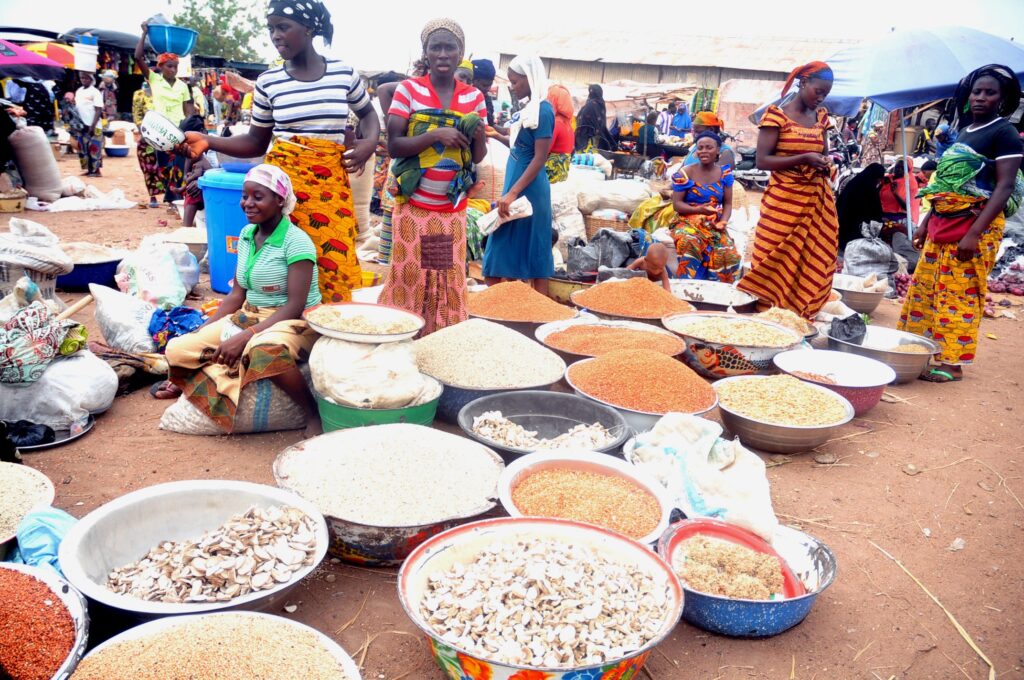
PIC.5. WOMEN SELLING GRAINS WARES AT IBI MARKET IN TARABA STATE ON FRIDAY (27/4/12).
- Edo Records 46.55% Hike
Latest data by the Nigeria’s National Bureau of Statistics (NBS) on Friday showed that the average prices of goods and services in the country continued northward in double digits for the month of October. Food prices due to the bad roads and unabating insecurity that elongates time to market of farm produce, leading to heavy loses, steady increase in prices of petroleum products with corresponding impact on cost of transportation remained the major culprits.
According to the report, Consumer prices rose by 118bps or 1.18% to 33.88% year-on-year in October, compared to 32.7% in September, while headline inflation rate on a year-on-year basis was 6.55% points higher than the 27.33% reported in October 2023.
Percentage change in the average CPI for the 12 months ending October 2024, when compared to that of the previous 12 months stood at 32.26%, representing an 8.82% growth over the 23.44% recorded in the similar period of last year.
Food inflation rate for the period under review ballooned to 39.16% on a year-on-year basis, 7.64% points higher compared to the 3`.52% recorded in October of prior year.
“The rise in Food inflation on a year -on-year basis was caused by increases in prices of the following items: Guinea Corn, Rice, Maize Grains, Rice, etc (Bread and Cereals Class), Yam, Water Yam, Coco Yam, etc (Potatoes, Yam & Other Tubers Class), Palm Oil, Vegetable Oil, etc (Oil and Fats Class) and Milo Lipton, Bourvita, etc (Coffee, Tea & Cocoa Class),” the NBS said.
The average annual rate of Food inflation for the twelve months ending October 2024 over the previous 12-month average, the report continued, “was 38.12%, which was an 11.79% points increase from the average annual rate of change recorded in October 2023 (26.33%).”
Also, YoY, urban inflation rate galloped 7.09% to 36.38%, compared to the 29.29% recorded in October 2023, while month-on-month, it was 2.75% from 2.67% in September. The corresponding twelve-month average for the Urban inflation rate stood at 34.52%, up from 24.76% in 2023, an increase of 9.76%.
Rural inflation rate was 31.59% YoY, representing a rise of 6.01% to the 25.58% recorded in October 2023, just as it rose by 2.53% MoM from 2.39%. The corresponding twelve-month average for the Rural inflation rate in October was 30.24%, up by 8.01% compared to the 22.23% recorded in October 2023.
On a state-by-state, All Items inflation rate was highest in Bauchi at 46.68%; followed by Kebbi, 40.02%); and Sokoto, 39.65%; while Delta recorded the slowest increase of 27.85%; ahead of Benue at 28.22%; and Katsina, 29.59%. MoM, however, the highest increases during the period was in Kano where it spiked 3.77%; wth Bauchi trailing with 3.74%; and Adamawa, 3.59%; while Kwara recorded the slowest growth of 1.27%; Ondo, 1.49%; and Lagos, 1.91%.
Food inflation YoY was also highest in Sokoto, 52.18%; Edo, 46.55%; and Borno, 45.85%; while Kwara recorded 31.68%, the slowest growth in the period; followed by Kogi, 33.30%; and Rivers, 33.87%.
MoM, October 2024 Food inflation was highest in Adamawa, 5.08%; Sokoto, 4.86%; and Yobe, 4.34%. Kwara was lowest at 1.11%; Ondo reported 1.31%; and Kogi, 1.50%.











